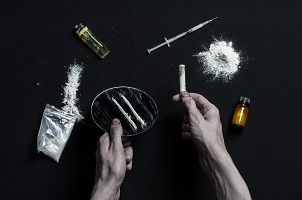Effects of heroin drug
Effects of Heroin Use
The Immediate and Short-Term Effects of Heroin Use
Heroin use has a range of immediate and short-term effects on the body, which can be extremely harmful. Upon administration, heroin rapidly enters the brain, creating a surge of euphoria. This intense feeling of pleasure is often what drives individuals to continue using the drug.
However, the effects of heroin use are not limited to euphoria. Users often experience dry mouth, a warm flushing of the skin, heavy feelings in the extremities, and clouded mental functioning. Additionally, nausea, vomiting, and severe itching are common side effects. The respiratory system is also significantly impacted, with slowed breathing that can sometimes lead to life-threatening respiratory failure.
Repeated heroin use can lead to tolerance, where the user needs to consume more of the drug to achieve the same effects. This can quickly escalate into physical dependence and addiction, as the body becomes accustomed to the presence of the drug and experiences withdrawal symptoms without it.
Understanding the Heroin Effect on Brain Function
Heroin significantly alters the brain’s structure and function. When heroin enters the brain, it is converted to morphine and binds to opioid receptors, which are involved in the perception of pain and reward. This interaction triggers the release of dopamine, a neurotransmitter associated with pleasure and reward, leading to the euphoric “high” that users seek.

Over time, heroin use can cause changes in the brain’s physical structure and physiology, creating long-term imbalances in neuronal and hormonal systems that are not easily reversed. Chronic heroin use can lead to a deterioration of the brain’s white matter, which may affect decision-making abilities, behavior regulation, and responses to stressful situations.
Moreover, heroin’s impact on the brain’s reward system can lead to intense cravings and compulsive drug-seeking behavior, making it extremely difficult for individuals to quit using the drug. These brain changes also contribute to the high relapse rates observed in individuals recovering from heroin addiction.
The Long-Term Heroin Effects on Overall Health
The long-term effects of heroin use extend beyond the brain and can impact various bodily systems. Chronic heroin users often suffer from a range of health complications, including collapsed veins, abscesses, and infections of the heart lining and valves. Pulmonary complications, such as pneumonia, are also common due to the poor condition of the respiratory system.
Additionally, the liver and kidneys can be severely damaged by prolonged heroin use, leading to conditions such as liver disease and kidney failure. Gastrointestinal issues, including constipation and cramping, are also prevalent among long-term users.
Heroin use during pregnancy can result in devastating consequences for both the mother and the unborn child. Infants born to mothers who use heroin are at increased risk of low birth weight, neonatal abstinence syndrome (NAS), and developmental delays.
Furthermore, the lifestyle associated with heroin addiction often leads to poor nutrition, increased risk of infectious diseases (such as HIV/AIDS and hepatitis), and a higher likelihood of engaging in risky behaviors that can result in injury or death.
Physical and Psychological Dependence on Heroin
Heroin addiction is a complex condition characterized by both physical and psychological dependence. Physical dependence occurs as the body adapts to the presence of the drug, leading to withdrawal symptoms when heroin use is reduced or stopped. These symptoms can include muscle and bone pain, insomnia, diarrhea, vomiting, cold flashes with goosebumps, and uncontrollable leg movements.

Psychological dependence, on the other hand, involves the emotional and mental aspects of addiction. Individuals may experience intense cravings for heroin and may feel unable to cope with daily life without the drug. This psychological grip can be incredibly powerful, often leading to compulsive drug-seeking behavior despite the negative consequences.
The combination of physical and psychological dependence makes heroin addiction particularly challenging to overcome. Comprehensive treatment approaches that address both aspects of addiction are essential for successful recovery.
Heroin’s Impact on Social and Economic Well-being
The impact of heroin use extends beyond individual health, affecting social and economic well-being. Addiction often leads to strained relationships with family and friends, social isolation, and difficulties in maintaining employment or education. The stigma associated with heroin addiction can further exacerbate these challenges, making it difficult for individuals to seek help and support.
Economically, heroin addiction can result in significant financial strain. The cost of obtaining the drug, combined with potential legal issues and healthcare expenses, can quickly deplete an individual’s resources. Additionally, the broader societal costs of heroin addiction, including law enforcement, healthcare, and lost productivity, are substantial.
Addressing the social and economic impact of heroin addiction requires a comprehensive approach that includes prevention, treatment, and support services to help individuals rebuild their lives and reintegrate into society.
The Role of Treatment and Support in Recovery
Recovery from heroin addiction is a challenging but achievable goal with the right treatment and support. Effective treatment approaches often involve a combination of medication-assisted treatment (MAT), behavioral therapies, and supportive services. MAT, which includes medications such as methadone, buprenorphine, and naltrexone, can help reduce cravings and withdrawal symptoms, making it easier for individuals to focus on their recovery.
Behavioral therapies, such as cognitive-behavioral therapy (CBT) and contingency management, address the underlying psychological aspects of addiction and help individuals develop coping strategies to maintain sobriety. Supportive services, including counseling, peer support groups, and case management, provide additional resources and encouragement throughout the recovery process.
Best Lean Online offers reliable services that can be a part of the recovery process. By providing access to treatment resources, support networks, and educational materials, Best Lean Online helps individuals navigate the challenges of recovery and work towards a healthier, drug-free life.
Preventing Heroin Use and Promoting Awareness
Preventing heroin use and promoting awareness about its dangers are crucial steps in addressing the heroin epidemic. Education and outreach efforts can help individuals understand the risks associated with heroin use and the importance of seeking help early. Public health campaigns, school-based programs, and community initiatives play a vital role in spreading awareness and providing resources for prevention.
Additionally, reducing the availability of heroin through law enforcement efforts and addressing underlying factors that contribute to drug use, such as socioeconomic disparities and mental health issues, are essential components of a comprehensive prevention strategy.

By working together, communities can create a supportive environment that discourages heroin use and promotes healthy, drug-free lifestyles. Crack cocaine for sale online.
Heroin’s impact on health is profound and far-reaching, affecting not only the individual but also their families and communities. The immediate and long-term effects of heroin use can lead to severe health complications, addiction, and significant social and economic challenges. Understanding these impacts is crucial for developing effective prevention, treatment, and support strategies.
Best Lean Online’s reliable services can play a key role in the recovery process, offering valuable resources and support for individuals seeking to overcome heroin addiction. By raising awareness, promoting prevention, and providing comprehensive treatment and support, we can work towards a future free from the devastating effects of heroin.

